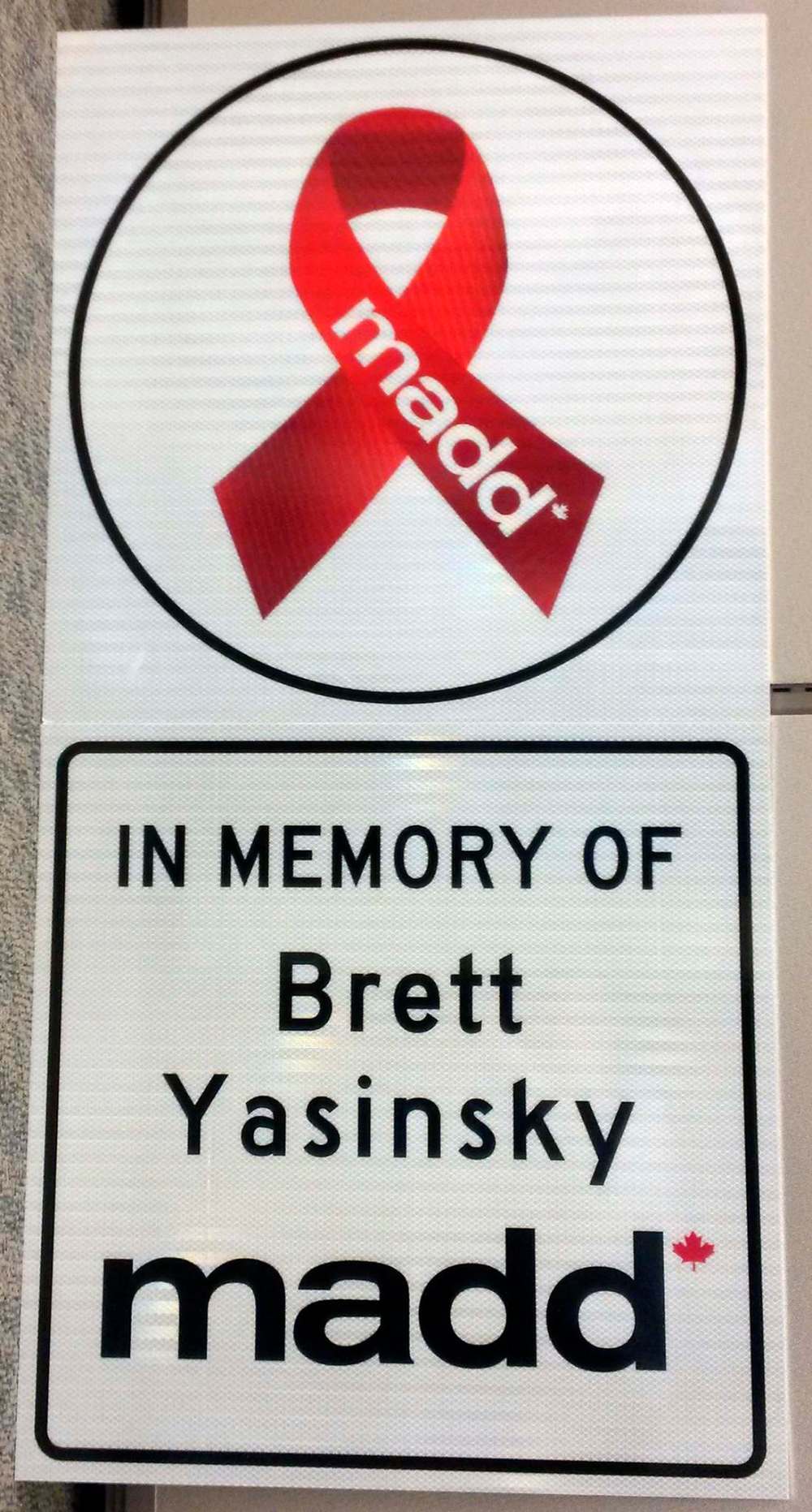Seeing beyond the sign
Aunt of victim of impaired driver hopes memorial will give drivers food for thought
Advertisement
Read this article for free:
or
Already have an account? Log in here »
To continue reading, please subscribe:
Monthly Digital Subscription
$0 for the first 4 weeks*
- Enjoy unlimited reading on winnipegfreepress.com
- Read the E-Edition, our digital replica newspaper
- Access News Break, our award-winning app
- Play interactive puzzles
*No charge for 4 weeks then price increases to the regular rate of $19.00 plus GST every four weeks. Offer available to new and qualified returning subscribers only. Cancel any time.
Monthly Digital Subscription
$4.75/week*
- Enjoy unlimited reading on winnipegfreepress.com
- Read the E-Edition, our digital replica newspaper
- Access News Break, our award-winning app
- Play interactive puzzles
*Billed as $19 plus GST every four weeks. Cancel any time.
To continue reading, please subscribe:
Add Free Press access to your Brandon Sun subscription for only an additional
$1 for the first 4 weeks*
*Your next subscription payment will increase by $1.00 and you will be charged $16.99 plus GST for four weeks. After four weeks, your payment will increase to $23.99 plus GST every four weeks.
Read unlimited articles for free today:
or
Already have an account? Log in here »
Hey there, time traveller!
This article was published 01/08/2018 (2694 days ago), so information in it may no longer be current.
Eight years ago, Brett Yasinsky hugged and said goodbye to his aunt on his way to see his girlfriend.
Minutes later, Yasinsky, 22, was dead, the victim of a drunk driver who sped through a red light and slammed into his car on a highway north of the city.
Now the spot where Yasinsky died, on Nov. 10, 2010, is being marked today with the unveiling of the province’s first roadside memorial sign for victims of impaired driving.

Melody Bodnarchuk, Yasinsky’s aunt and a former president of the local chapter of MADD, said she hopes the sign convinces motorists to make a different decision before getting behind the wheel impaired.
“Every day I think of his loss and of our losses,” Bodnarchuk said on Tuesday.
“We’re not going to his wedding or the birth of his child. And this wasn’t an accident — this was a choice for that driver.”
Yasinsky suffered catastrophic injuries when a vehicle, driven by Brad Skawretko, hit the door beside him. Skawretko was later found to have triple the legal limit of alcohol in his system at the time.
Skawretko later pleaded guilty and was sentenced to 30 months in prison. He admitted to driving 110 km/h in an 80 km/h zone before T-boning Yasinsky’s car — which had the right of way — at Highway 8 and Grassmere Road.
“I am so sorry for causing so much sadness,” Skawretko said during sentencing. “I can only imagine the anger Brett’s family and friends have for me.
“I can only pray for their forgiveness. I will never forget that night. Please know it has changed my life forever.”
But Justice Brenda Keyser, of Manitoba Court of Queen’s Bench, called crimes such as Skawretko’s “tragic, heartbreaking and totally preventable situations.”
The sign to be unveiled has the MADD red ribbon above the words “In memory of Brett Yasinsky.” The logo for MADD is at the bottom.
The sign is posted beside the southbound lanes of Highway 8, just south of Grassmere Road.
Besides Bodnarchuk and her husband Wayne, others at the unveiling ceremony will include MaryAnn Mihychuk, the federal MP for Kildonan-St. Paul, Ron Schuler, the province’s minister of infrastructure and MLA for St. Paul, West St. Paul Mayor Bruce Henley and representatives of the RCMP and Manitoba Public Insurance.
Bodnarchuk said Yasinsky’s mother, Connie Jaman, never got over the loss of her son, suffering a heart attack shortly after his death and dying of cancer last year.
“I truly believe losing her son is what contributed to her early demise — she was only 54,” she said.
“I hope she and Brett are floating around and going to be witness to this unveiling.”
Gillian Phillips, MADD’s victim services manager for western Canada, said Saskatchewan was the first province in western Canada to have the signs, with Manitoba being the second and Alberta to follow later this year. Ontario will get its first one later in August.
Phillips said the signs are meant to not only memorialize the person killed, but also to educate people about the dangers of impaired driving.
She said the signs are paid for by MADD, but only go up if the family of the deceased requests one and if the victim meets certain criteria.
“The signs can only go on a highway — not local in a city — and there has to have been a conviction for impaired driving,” Phillips said.
“The signs are not something we want any family to apply for because it means they have lost a loved one. Behind every sign there is a family.”
kevin.rollason@freepress.mb.ca

Kevin Rollason is one of the more versatile reporters at the Winnipeg Free Press. Whether it is covering city hall, the law courts, or general reporting, Rollason can be counted on to not only answer the 5 Ws — Who, What, When, Where and Why — but to do it in an interesting and accessible way for readers.
Our newsroom depends on a growing audience of readers to power our journalism. If you are not a paid reader, please consider becoming a subscriber.
Our newsroom depends on its audience of readers to power our journalism. Thank you for your support.


